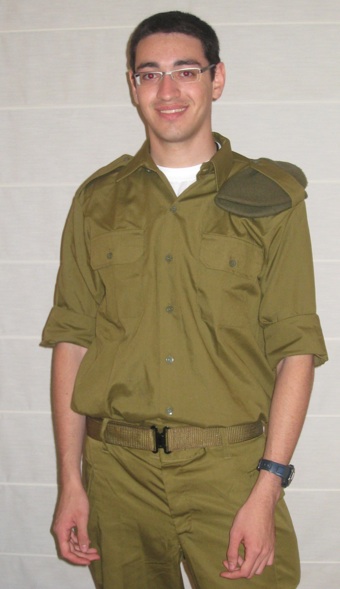 On his way back from Tel Aviv, 18-year-old Amir called to ask if I could pick him at the Jerusalem Central Bus Station. He was carrying a heavy bag and didn’t want to schlep it all the way home. Fair enough.
On his way back from Tel Aviv, 18-year-old Amir called to ask if I could pick him at the Jerusalem Central Bus Station. He was carrying a heavy bag and didn’t want to schlep it all the way home. Fair enough.
I arrived at our agreed upon meeting place but I didn’t see my son.
“I’m just before the traffic circle,†I said to Amir over the cell phone. “Which circle?†he asked. “The one next to the parking lot,†I replied. “I’m there,†he said.
“I don’t see you…wait a minute…are you wearing greens?â€
And there he was, sauntering down the sidewalk, a tall lanky figure dressed in a brand new uniform and carrying a large “kitbag.â€
When he left that morning, Amir had been a civilian. He was returning home now at the end of the day as a soldier. Amir had just joined the Israel Defense Forces.
When we first arrived in Israel 15 years ago and Amir was only three, the thought of the army was just a whisper, a patriotic inevitability, but far from any sense of reality.
Now that the moment had arrived, I knew it would be emotional but I surprised even myself by the depth of pride that enveloped me at this staunchly Zionist rite of passage, no less intense than my feelings at Amir’s birth, brit and bar mitzvah.
That feeling was backed up by a second picture from the day that has already been seared into memory: the look on Amir’s 16-year-old sister’s face as he walked in the front door in uniform – a buoyant sense of awe and appreciation mixed with a dash of apprehension and followed by a hug that reflected the faint trickle in her eyes.
Eleven-year-old Aviv was more circumspect, letting out a startled hiccup before throwing himself into Amir’s arms as well.
It’s not hard to explain my reaction. Isn’t this the reason we moved to Israel? To be in control of our own destiny as Jews; to not be at the whims of any other nation? The soldiers who defend those rights militarily allow the rest of us to benefit. And, of course, joining the army marks a uniquely Israeli coming of age milestone and perhaps, also, a subtle negation of one’s immigrant status.
It’s nevertheless jarring to have a child in the army. Amir is the first in our family; none of his grandparents or even great grandparents ever served.
“What’s in the bag?†Jody asked our new soldier son, eyeing his hefty green accessory. Amir listed off a Jerusalem mixed grill of supplies: two uniforms; a heavy winter jacket; a toothbrush, razor and sewing kit; several white t-shirts, socks and even underwear.
The army has to provide everything in case a soldier is all on his or her own, or comes from a home that can’t provide the basics, Amir explained. After the initial supply, the soldier gets NIS 350 (just under $100) for monthly essentials.
The army is full of traditions we learned. The first apparently is “shaving the beret.†The new cadet’s cap has little fuzzies all over it. In order not to look too green, so to speak, soldiers take a knife and scrap off the fluff. Other tricks include washing your uniforms several times so they don’t shine so much.
Amir’s first day in the army was a short one: he received his uniform and instruction in how to wear it properly (“you’re representing your country whenever you’re out,†the army representative had said).
Then, after getting his dog tags, Amir underwent a head scan, a full dental mold, fingerprints and a DNA test (which consisted of a prick on a finger and then squeezing out blood to fill several patterns on a paper).
The reasons for the latter were unfortunately clear: the military needs a way to identify a soldier should he fall in battle – a stark reminder of the reason we need an army in the first place.
But for now, we’ll put that aside and for one day at least, bask in our pride.
———————-
This story originally appeared earlier this week on the Israelity blog.


{ 1 trackback }